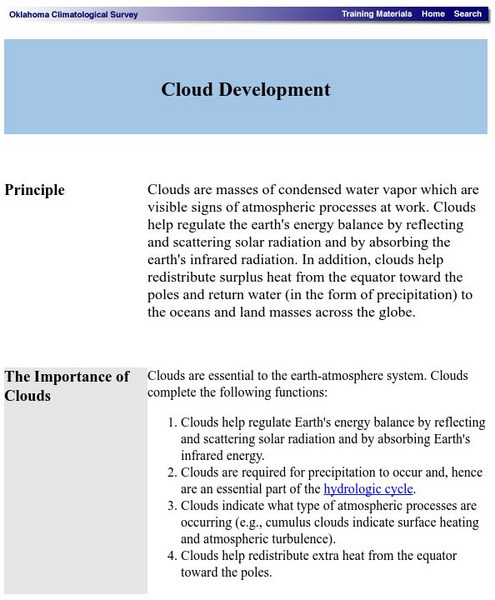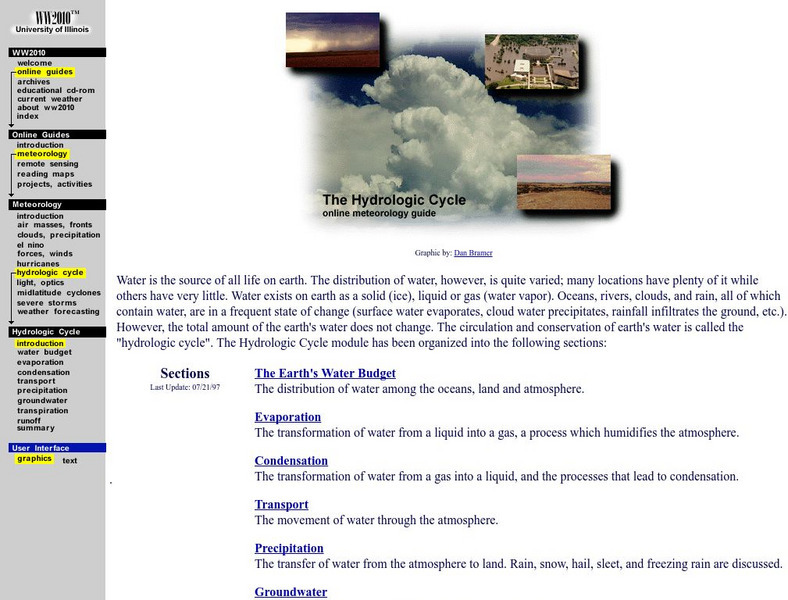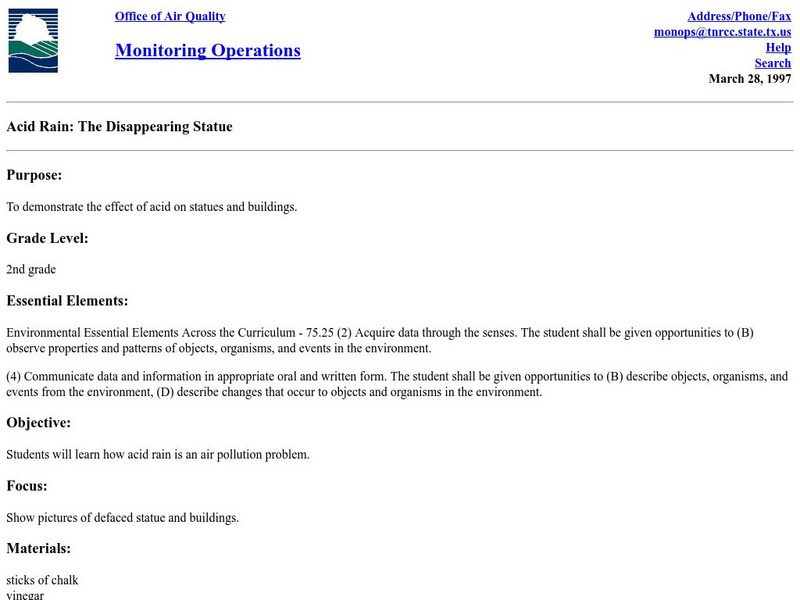Hi, what do you want to do?
Science Education Resource Center at Carleton College
Serc: Investigating Precipitation: Snow
In this chemistry field/class based activity, students investigate snow and, more specifically, why snowflakes have six sides. Students will individually fossilize a snowflake and observe similarities and differences with other members...
Oklahoma Mesonet
Oklahoma Climatological Survey: Cloud Development
This site explores the importance of clouds and how clouds are formed. Content details common atmospheric cooling mechanisms and atmospheric stability.
Frostburg State University
General Chemistry Online: Ten Signs of Chemical Change
Resource provides the ten signs that tell when a chemical change has occured. Each sign has a detailed explanation.
University of Illinois
University of Illinois Urbana Champaign: The Hydrologic Cycle
Water is the source of life on earth. It exists in many forms and is constantly changing. The circulation and conservation of earth's water is called the hydrologic (or water) cycle. Find out how water evaporates, condensates,...
USA Today
Usa Today: How Winter Storms Bring Rain, Ice and Snow
A great diagram of precipitation and what forms at different degrees. A short description on the formation of rain, snow, and sleet.
BBC
Bbc: Gcse Bitesize: Calculations for All Students
Law of conservation of mass: No atoms are created or destroyed in a chemical reaction. They just join together in a different way than they were before the reaction, and form products. This means that the total mass of the products in a...
USA Today
Usa Today: Understanding Clouds and Fog
Learn about the different kinds of clouds, their location in the sky, how they form, their influence on the weather, and unusual cloud shapes.
Michigan Reach Out
Reach Out Michigan: Acid Rain
This experiment from Reach Out Michigan "demonstrates the effect of acid rain on statues and buildings."
Other
The Hydrological Cycle an Human Impact on It. [Pdf]
The hydrological cycle is usually called a recurring consequence of different forms of movement of water and changes of its physical state on a given area of the Earth. The role of different processes in the hydrological cycle and their...
Science Buddies
Science Buddies: Maple Syrup: For Pancakes, Waffles, and Crystal Candy?
Maple syrup is deliciously gooey and great on breakfast foods like pancakes and waffles. But it has another amazing property. It can form crystals under the right circumstances, and the crystals change in size and shape, depending on...
Globe
The Globe Program: Do You Know That Clouds Have Names? [Pdf]
Did you know that clouds have different names? Each cloud in the sky has its own unique form and it has a particular name based on its shape, where it floats in the sky and the type of moisture it contains. Learn here all about the...
The History Cat
The History Cat: The Constitutional Convention: Creating the Constitution
Explains why the Articles of Confederation were not strong enough to hold the country together. One result was a farmers' rebellion in Massachusetts led by Daniel Shays, which was precipitated by a debt crisis that caused many farmers to...
Science Struck
Science Struck: Sedimentary Rock Formation Explained
Explains what sedimentary rocks are, the three main types, and how they are formed.
Curated OER
Educational Technology Clearinghouse: Maps Etc: South China, 1971
"South China comprises the drainage basins of the middle and lower Yangtze River, the basin of the His Chiang (West River) in Kwangtung and Kwangsi; and the mountainous coastal provinces of Fukien and Chekiang. The division between the...
Encyclopedia Britannica
Encyclopedia Britannica: Al Sharpton
Biographical details on Al Sharpton who began preaching at age four and became an ordained Pentecostal minister at age 10. A colorful and popular figure in the African American community, he embarked upon controversial protests that...













![The Hydrological Cycle an Human Impact on It. [Pdf] Article The Hydrological Cycle an Human Impact on It. [Pdf] Article](https://static.lp.lexp.cloud/images/attachment_defaults/resource/large/FPO-knovation.png)

